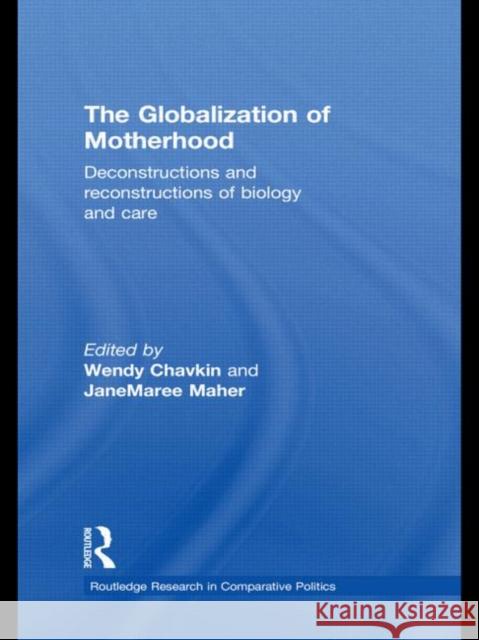The Globalization of Motherhood: Deconstructions and Reconstructions of Biology and Care » książka
The Globalization of Motherhood: Deconstructions and Reconstructions of Biology and Care
ISBN-13: 9780415778947 / Angielski / Twarda / 2010 / 288 str.
The Globalization of Motherhood: Deconstructions and Reconstructions of Biology and Care
ISBN-13: 9780415778947 / Angielski / Twarda / 2010 / 288 str.
(netto: 695,40 VAT: 5%)
Najniższa cena z 30 dni: 705,23
ok. 22 dni roboczych.
Darmowa dostawa!
The convergence of dramatic declines in birth rates worldwide, aside from sub-Saharan Africa, the rise of untrammelled global movement of capital, people and information, and the rapid-fire dissemination of a host of new medical technologies has led to the "globalization of motherhood." This book brings together research from the Global North and the Global South to illuminate how contemporary motherhood is being changed by the processes of globalization. It locates declining fertility and desire for motherhood in the context of female employment, the development of the global market in reproductive technologies, the rising transnational labour market demand for feminized carework, and changing family forms. Focusing on the impacts on women who mother- and enable others to do so- across diverse contexts, the book examines the way in which conception, gestation mothering labor and care are being mobilized across national boundaries. Bringing together demographers, sociologists, lawyers, public health and social theorists, this book will be of interest to students and scholars of globalization studies, development studies, gender studies, feminist politics, political economy, human rights, and social policy.
The convergence of dramatic declines in birth rates worldwide (aside from sub-Saharan Africa), the rise of untrammeled global movement of capital, people and information, and the rapid-fire dissemination of a host of new medical technologies has led to the "globalization of motherhood".
This book brings together research from the Global North and the Global South to illuminate how contemporary motherhood is being changed by the processes of globalization. This volume examines the ways in which conception, gestation mothering labor and care are being mobilized across national boundaries and between different domains of technology, adoption and care work. Considering these multiple forms of caring and reproductive labor together allows for an interrogation of the globalization of motherhood with a focus on the impacts on women who mother- and enable others to do so- across these diverse contexts.
Bringing together demographers, sociologists, lawyers, public health and social theorists, this book will be of interest to students and scholars of globalization studies, development studies, gender studies, feminist politics, political economy, human rights, and social policy.











